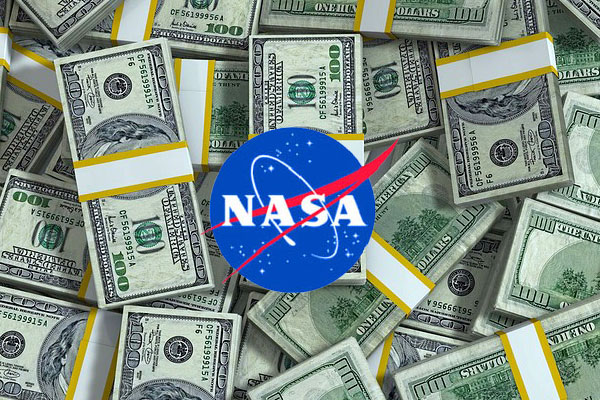NASA Budget Cuts-The Final Frontier

November 13, 2019
“Star Trek” made famous the idea that space is the final frontier, and we are well on our way to never again trying to live up to this idea. With recent NASA budget cuts and changes and the privatization of space travel, Earth’s greatest chance to “boldly go where no man has gone before” is slipping away.
Although many people may consider NASA an unnecessary government agency, the National Aeronautics and Space Administration has made countless revolutionary discoveries and pushed the bounds of science forward. NASA continually develops new missions and projects to discover more about our planet and the universe we live in. Many private US and international companies also continue to be supported and conduct business with NASA. In the US the space industry is quickly growing and part of that is NASA’s collaboration with private space companies from Boeing to SpaceX.
Earlier this year, a new budget proposal from the White House suggested a 5% increase in funding to NASA, resulting in a budget of $22.6 billion for 2020. While this may seem like a step in the right direction, the motives behind such a budget increase could be somewhat convoluted. The new budget increase would go towards Project Artemis, an initiative from President Trump mandating a return to the moon. However, the new budget proposal also proposes cutting funding from the Wide Field Infrared Survey Telescope (WFIRST), and two Earth Science missions: the Plankton, Aerosol, Cloud, ocean Ecosystem (PACE) spacecraft, and the Climate Absolute Radiance and Refractivity Observatory (CLARREO). Interestingly, both of these Earth Science missions are dedicated to learning more about the climate of Earth and applying that data towards the analysis of climate change, something President Trump publicly denies.
This is a common theme with the U.S. budget. The President will propose a budget plan for the upcoming fiscal year. However, instead of proposing a budget that will improve the lives of American citizens and help to further important departments such as science, environment, and education, politicians will propose and approve budgets to further their own political or personal agenda. This seems to be the goal behind the adjusted NASA budget. Although it is increasing the budget slightly, it is actually defunding important scientific projects that the president simply disagrees with. This could be indicative of a larger, more serious issue within the U.S. budget, in that it provides evidence that most budget situations within the United States are primarily for the politicians gain and not for actually helping improve the United States or the rest of the world.
Despite this issue of budgetary concerns with climate science projects, the fluctuation of NASA’s budget continually hinders the progress of the agency. There are many private space companies that have great potential and could prove to be the next stage of space exploration. However, at this point in time, these companies lack the same resources as government-run agencies such as NASA. As a result, NASA remains at the forefront of space exploration and one of the only entities capable of reaching and exploring astronomical bodies such as Mars, the Moon, and many other promising moons, asteroids, and planets in our solar system. Despite this great potential, NASA’s budget and projects are constantly changing due to new NASA leadership and new presidential administrations. Each new person has a new agenda. This results in a scenario where any projects that may take more than 4-8 years are in danger of being canceled. This means that one of humanity’s greatest sources of scientific discovery is constantly in a state of uncertainty. Although the new NASA budget has the potential to do great things (see Cougar Daily Article on Project Artemis), it is also serving the agenda of the current president creating a political and scientific dilemma.
The primary takeaway from the proposed NASA budget changes is that no political issue is black and white. Taken at face value, the recent NASA budget changes seem positive because of the increase in budget, but behind the scenes, it serving a somewhat manipulative purpose of canceling specific climate projects. Although the new NASA budget has the potential to do great things (see Cougar Daily Article on Project Artemis), it is also serving the agenda of the current president creating a political and scientific dilemma. It is also evidence of a greater issue of the effect that an ever-changing government can have on progress. This is a complicated issue, but it just proves that everything should be viewed with a critical stance.

